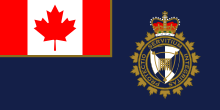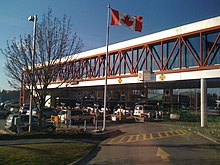Canada Border Services Agency
|
|||
|---|---|---|---|
| State level | Federal level | ||
| Position of the authority | Border protection, civil defense | ||
| Supervisory authority (s) | Public Safety Canada | ||
| Consist | since December 12, 2003 | ||
| Headquarters | Ottawa , Ontario | ||
| President of the Canada Border Services Agency | John Ossowski | ||
| Employee | 14,171 (as of March 31, 2016) | ||
| Website | www.cbsa-asfc.gc.ca | ||
The Canada Border Service Agency (CBSA) or Agence des services frontaliers du Canada (ASFC) in the official French language is a Canadian authority that is responsible for border crossing, immigration controls ( border controls ) and customs controls . It was founded on December 12, 2003 and reports to the Department of Public Safety (Public Safety Canada). The establishment of the agency was advanced due to the terrorist attacks on September 11, 2001 and the increased need for security of the North Americans . Several agencies have been merged, including the previous Customs Service , Immigration Service, Border Control Service and Food Control Service, in order to improve the exchange of information between the individual authorities and to increase effective security for the whole of North America. The authority works closely with other security authorities in Germany and abroad.
history
By 2004, the country's borders were monitored by three agencies, namely the Canada Customs and Revenue Agency , Citizenship and Immigration Canada, and the Canadian Food Inspection Agency . The CBSA was founded in the course of restructuring measures, the aim of which was to make the processes and internal communication channels better and more effective.
The establishment of the agency coincided with the entry into force of the Canada Border Services Agency Act on November 3, 2005. Because of the terrorist attacks in the USA on September 11, 2001, Canada endeavored to increase security standards and public safety due to the new threat situation Secure life. Canada and the US agreed in an agreement drawn up between John Manley and Tom Ridge that the two countries would work together more thoroughly and more closely in the future to jointly tackle terrorism.
tasks
The Canada Border Services Agency (CBSA) has 1,200 service offices within Canada and 39 offices in other countries. The CBSA monitors the national border at 119 border locations as well as at 13 international airports in the country. The agency is also represented in several major Canadian ports and rail facilities. Mail is checked in three distribution centers.
The tasks of the authority include:
- Administrative tasks (especially checking the import / entry of people and goods as well as animals)
- Protection and early detection of potential dangers (includes the review and control of certain groups of people)
- Arrest and deportation of people (organized crime, terrorism)
- Preventing the import and export of illegal goods (e.g. drugs)
- Monitoring of imported goods (for animals, plants to protect against diseases and germs)
- border controls
Border Services Officer
The Border Services Officers (BSO) are border guards from the Canada Border Services Agency. Officials are responsible for complying with many laws, including immigration and import laws. The officers are armed with handcuffs, pepper spray, batons and a gun, Beretta Px4 Storm.
border controls
In the immigration and entry to Canada , the Canada Border Services Agency (CBSA) plays an important role. CBSA officials control and search people entering the country. Foreigners who have a criminal record or who have violated Canadian law may be denied entry to Canada. Depending on the violation of the law, a ten-year entry ban can be imposed on a person in the most extreme case.
Entry, import and export
All people and goods are subject to customs controls by CBSA officials. Customs controls can be carried out briefly on entry by answering a few questions from the official, or slowly and thoroughly by means of longer questions or more detailed searches of the luggage, the vehicle or through intensive personal checks. The officers are legally empowered to conduct searches.
For Canadian and American citizens, there are less bureaucratic entry requirements for the USA and Canada. There are special procedures such as B. NEXUS and CANPASS, which facilitate and accelerate entry for participants.
statistics
The CBSA published the following statistics for 2012:
In 2012, CBSA officials screened approximately 2 million people a week. Between 2008 and 2009, they checked 1.7 million people weekly. Thus the controls increased by 300,000 people. Around 574 firearms and 24,243 other weapons such as stabbing and striking weapons of various types were confiscated in 2012. The officials confiscated and destroyed intoxicants such as cocaine, heroin, and marijuana worth $ 305 million. In addition, over 18,000 illegal persons without valid residence status were deported and 50,931 people were refused entry.
Dog relay
The CBSA began using three search dogs in 1978 on the border in Windsor, Ontario Canada. The search dog squad has grown continuously since then. Today the CBSA has 69 trained search dogs located at border checkpoints across Canada. Each dog was trained in one of the following three specialties for several months:
- Sniffing out illegal substances such as drugs (including heroin), explosive materials and firearms
- Finding hidden funds and currencies to track down money laundering
- Finding objects such as plants, animals and food that are prohibited from importing
documentation
The television station National Geographic Channel has been producing a documentary series about the authority which is broadcast in the program since 2012. The series is known under the title: Border Security: Canada's Front Line . The series illustrates in several episodes the tasks of the officers at various border controls in Canada.
criticism
CBSA claims the right to search travelers' electronic devices without giving a reason. If a traveler refuses to hand over passwords at the border, e.g. B. for laptops , smartphones, etc. Ä., then the office confiscates the devices for an indefinite period. This also applies to people with such professions, which usually require a particularly protected relationship of trust, e.g. B. between lawyer and client. There is a campaign in Canada against this inspection of the equipment because the process is viewed as a violation of a human right . Those affected currently have to file a legal action in order to possibly get their devices back after a long time.
Web links
- Official Canada Border Services Agency website (English and French)
Individual evidence
- ↑ https://www.cbsa-asfc.gc.ca/agency-agence/pr-bio-eng.html
- ^ Population of the Federal Public Service by Department. Government of Canada - Department of Treasury, September 22, 2016, accessed February 27, 2017 .
- ^ CBSA - About the CBSA: Who we are , accessed April 30, 2014.
- ↑ BILL C-26: CANADA BORDER SERVICES AGENCY ACT , accessed December 12, 2012.
- ^ Government of Canada - Canada Border Services Agency Act, Department of Justice
- ↑ CBSA National Statistics - January 1, 2012 to December 31, 2012 ( Memento of April 22, 2013 in the Internet Archive ), accessed April 17, 2013.
- ^ National Geographic TV - Border Security: Canada's Front Line , accessed April 17, 2013.
- ↑ Measure in April 2019 in Toronto against Nick Wright , CBC , May 5, 2019



